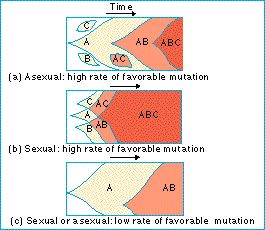Sex: faster evolution

A population of sexually reproducing organisms can, under some conditions, evolve faster than a similar number of asexual organisms.
A famous diagram illustrates the argument, which contends that sexual reproduction enables beneficial mutations of different genotypes to be combined into single genotype. This argument was first put forward by Fisher, who concluded that sexual populations have a more rapid rate of evolution than would an otherwise equivalent group of asexual organisms.
Fisher's conclusion depends on the rate of mutation:
• If favorable mutations are rare, each one will have been fixed in the population before the next one arises. New favorable mutations will always arise in individuals that already carry the previous favorable mutation. Sexual and asexual populations then evolve at the same rate.
• If favorable mutations arise more frequently, Fisher's argument works: the sexual population evolves faster. Each new favorable mutation will usually arise in an individual that does not already possess other favorable mutations; the greater speed with which the different favorable mutations combine together causes the sexual population to evolve faster.
The higher the rate at which favorable mutations are arising, the greater the evolutionary rate of a sexual relative to an asexual population.
This is a case of group selection because it claims that the cost of sex is more than made up for by the faster evolution of the sexual population, or group.
Figure: evolution in (a) asexual and (b) sexual populations. The mutations A, B and C are all advantageous. In the asexual population, an AB individual can arise only if the B mutation arises in an individual that already has an A mutation (or vice versa.) In the sexual population, the AB individual can be more easily formed by breeding of a B mutation-bearing individual with an A mutation-bearing individual. (c) If favorable mutations are rare, each will have been fixed before the next mutation arises, and sexual populations will not evolve more rapidly.
Why should we be suspicious of a group selection account of the advantage of sexual reproduction?
| Next |



